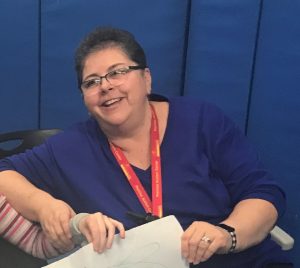Darlene Kelly on Navigating Change at PEP

This year has been an exciting one in many ways at Positive Education Program. Not only has the organization adopted a new strategic framework – including new mission, vision and values – it has also changed its branding and logo. PEP looks different today than when it was founded in 1971, both in its programs and its literal appearance.
If all these big changes have you wondering about how a 50-year old organization manages to keep reinventing itself and adapting to all this change, Darlene Kelly, PEP principal at PEP Prentiss Autism Center and 36-year PEP veteran has some answers. Recently, she took some time to answer some questions about her time at PEP and how the organization manages change.
Q: Have you witnessed a lot of change at PEP during your tenure?
A: Of course! I’ve been at PEP 36 years. It was a completely different organization when I started. We had a different set of services at the time, and they have only continued to evolve throughout my tenure. One of my favorite things about PEP is that we aren’t afraid to try new ideas when it comes to making a difference for the kids we serve.
Q: Why do you think it’s possible for PEP to weather so much change?
A: I think it comes down to the fact that even though we may change the way we do things, we don’t change what drives us. The Re-ED philosophy was adopted upon our founding and serves as an unwavering set of guiding principles. No matter what we do or what we try, it stays true to these principles.
Q: You mentioned that you like that PEP isn’t afraid to try new ideas when it will benefit the kids. Can you give an example of that?
A: I see it every day. All our staff are shifting and adapting every day with our kids, trying to find the best way of relating to and connecting with them. We know our work can’t be stagnant. I’ve also seen it many times in a bigger picture way. One example that comes to mind is our shift to a trauma-informed care approach. When research began showing its benefits, we knew it was a way to enhance the quality of our work without compromising our guiding principles.
Q: The pandemic lockdown required a massive amount of change. How did you manage that?
A: There were enormous challenges and so much uncertainty. We were unsure what the next day might bring. I frequently found myself thinking about what was needed to make it all work. Thoughts like: Trust is Essential; Time is an Ally; and Ceremony and Ritual Give Order – just to name a few, kept coming to my mind. That experience was one of the most difficult of my career and where did my mind go? How did I navigate it? The Re-ED principles. They got us through again.
Q: What do you think is next for PEP?
A: As we continue to move forward, we will undoubtedly face more uncertainty and more change. We have withstood the test of time and I’m confident we will continue to do so. As George Bernard Shaw so eloquently put it, “Progress is impossible without change, and those who cannot change their minds cannot change anything.”
